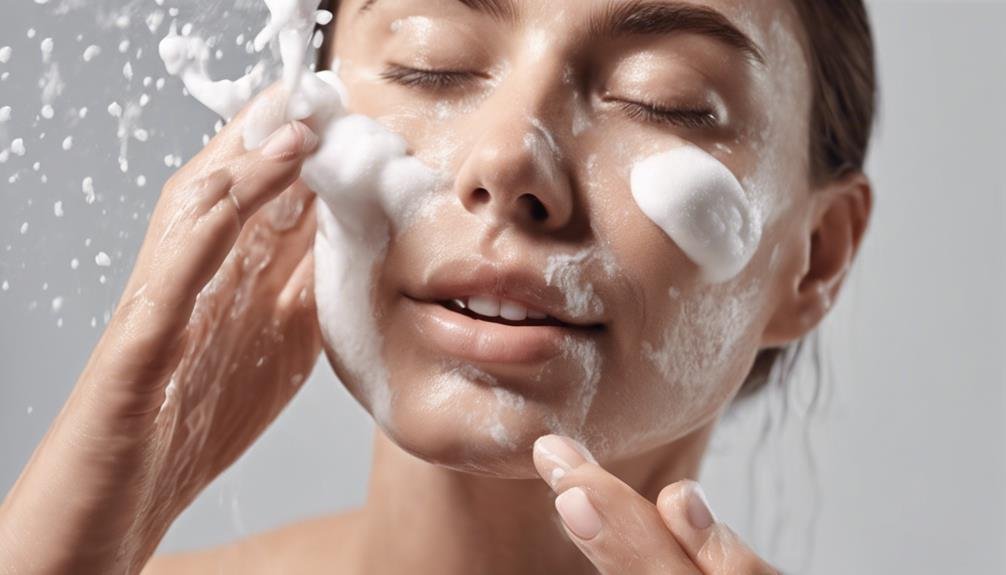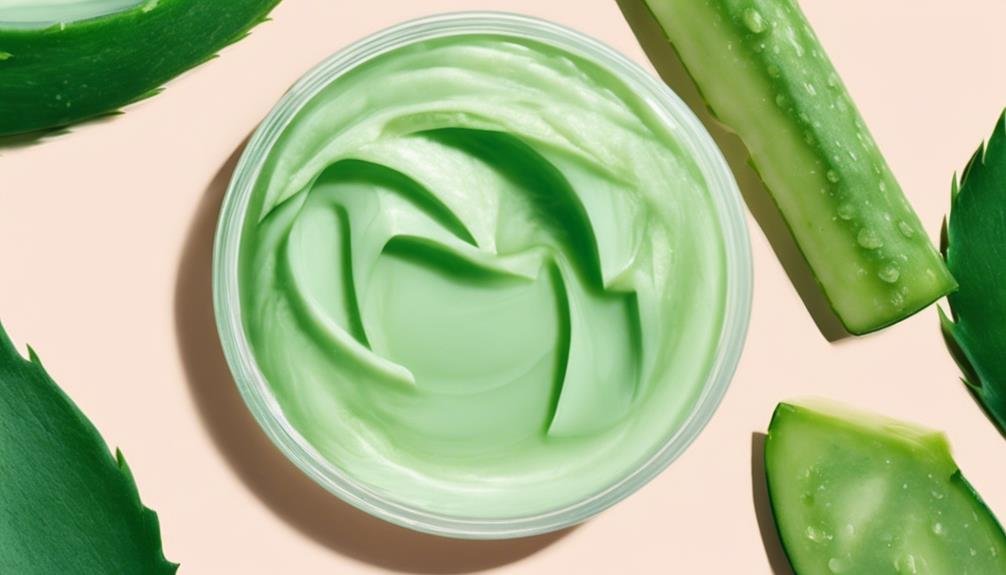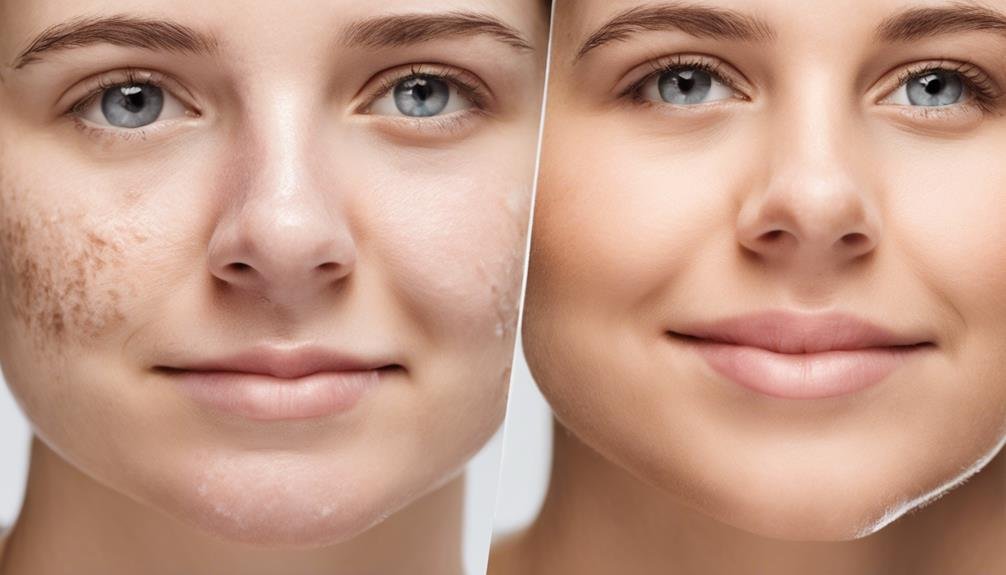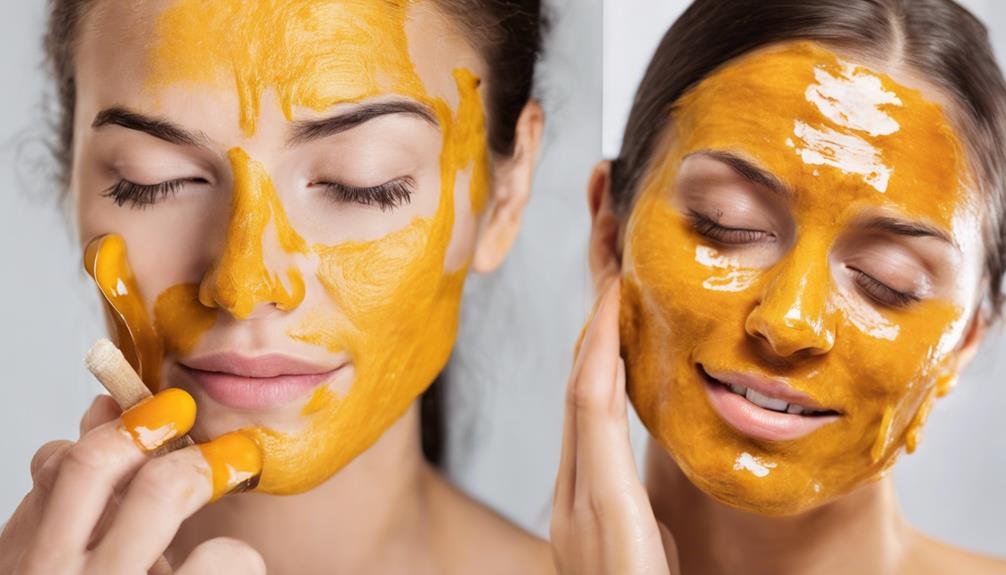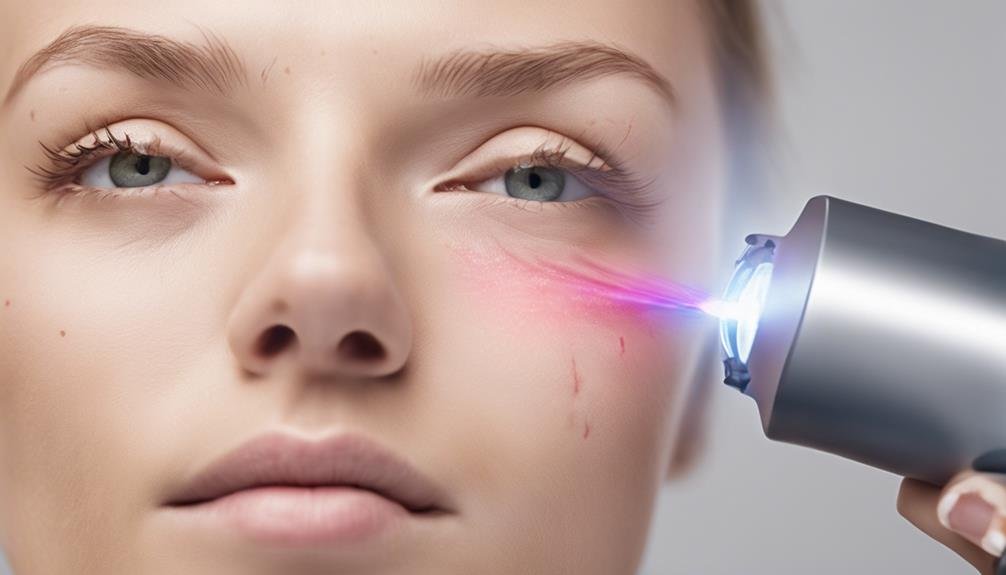If you're tired of dealing with acne scars, you're not alone; studies show that up to 95% of individuals with acne also end up with scarring. Wondering how to reduce those stubborn marks fast? There are various effective strategies you can implement to help fade acne scars quickly and improve the overall appearance of your skin. From professional dermatological treatments to simple at-home remedies, finding the right approach for your skin can make a significant difference in achieving smoother, scar-free skin. Whether you're exploring advanced procedures like microneedling or looking for natural DIY solutions, the path to reducing acne scars fast might be closer than you think.
Key Takeaways
- Consider professional treatments like microneedling or laser therapy for quick results.
- Use skincare products with ingredients like retinol or vitamin C to fade scars rapidly.
- Keep skin hydrated with moisturizers to aid in scar healing and reduction.
- Protect scars from sun exposure by using sunscreen daily to prevent darkening.
- Consult a dermatologist for personalized advice on fast and effective scar treatments.
Understanding Acne Scars
Acne scars can be a frustrating reminder of past breakouts, but understanding their nature is crucial in finding effective treatment options. Acne scars result from the body's natural healing process after severe acne lesions. When the skin tissue is damaged during an acne breakout, the body produces collagen to repair the area. However, this healing process can sometimes lead to an uneven skin surface, causing the formation of scars.
There are different types of acne scars, including atrophic scars (depressions in the skin) and hypertrophic scars (raised scars). Atrophic scars are more common and are further categorized into ice pick, rolling, and boxcar scars based on their appearance. Understanding the type of acne scars you have is essential in determining the most suitable treatment approach.
Various treatment options are available for acne scars, such as chemical peels, microneedling, laser therapy, and dermal fillers. Consulting with a dermatologist can help you identify the most effective treatment for your specific type of acne scars. Remember, patience is key as reducing acne scars takes time and consistent effort.
Importance of Sun Protection
To effectively care for your skin and minimize the appearance of acne scars, understanding the importance of sun protection is paramount. Sun exposure can exacerbate acne scars by causing them to darken and become more prominent.
UV rays stimulate the skin to produce more melanin, the pigment responsible for dark spots, making scars harder to fade over time. By incorporating sun protection into your skincare routine, you can prevent further damage to your skin and help existing scars heal more effectively.
Using a broad-spectrum sunscreen with an SPF of 30 or higher daily can shield your skin from harmful UV rays. Additionally, wearing protective clothing, like hats and sunglasses, and seeking shade during peak sun hours can further safeguard your skin.
Remember that consistent sun protection is key to reducing the risk of additional scarring and allowing current scars to fade naturally. Prioritizing sun protection won't only benefit your skin's health but also aid in the overall improvement of your acne scars.
Gentle Cleansing Techniques
For optimal skin care and acne scar reduction, employing gentle cleansing techniques is crucial. When washing your face, opt for a mild, non-abrasive cleanser that's suitable for your skin type. Harsh products can strip the skin of its natural oils, leading to irritation and potential worsening of acne scars. Be gentle when cleansing, using your fingertips in a circular motion to avoid excessive rubbing or scrubbing.
Rinse your face with lukewarm water, as hot water can be drying and irritating to the skin. Pat your skin dry with a soft towel, avoiding harsh rubbing that could cause inflammation. Remember to cleanse your face twice daily, in the morning and evening, to keep your skin clean and free from acne-causing bacteria.
Exfoliation for Smoother Skin
To achieve smoother skin and further diminish acne scars, incorporating exfoliation into your skincare routine is key. Exfoliation helps remove dead skin cells that can clog pores and lead to acne breakouts. By gently sloughing off these dead skin cells, you can reveal fresh, new skin underneath, which can help reduce the appearance of acne scars over time.
When choosing an exfoliant, opt for products with ingredients like salicylic acid or glycolic acid, which can penetrate the skin and unclog pores effectively. Physical exfoliants like scrubs can also be beneficial, but be cautious with them, as they can irritate the skin if used too vigorously.
It's important to exfoliate no more than 1-2 times per week to avoid over-exfoliation, which can damage the skin barrier and worsen acne scars. After exfoliating, remember to follow up with a gentle moisturizer to keep your skin hydrated and protected. By incorporating exfoliation into your skincare routine, you can help achieve smoother, healthier-looking skin and reduce the appearance of acne scars.
Hydration and Skin Healing
Maintaining proper hydration is crucial for promoting skin healing and reducing the visibility of acne scars. When your skin is well-hydrated, it functions optimally, aiding in the repair of damaged tissues and promoting a smoother complexion. Hydration also helps in the production of collagen, which is essential for skin elasticity and repair. To ensure you are adequately hydrated, drink plenty of water throughout the day and use hydrating skincare products.
Here is a table to illustrate the importance of hydration in skin healing:
| Benefits of Hydration for Skin Healing |
|---|
| Helps repair damaged tissues |
| Promotes collagen production |
| Enhances skin elasticity |
| Improves overall skin texture |
Incorporating Vitamin C
Regularly incorporating Vitamin C into your skincare routine can play a significant role in reducing acne scars and promoting overall skin health. Vitamin C is a powerhouse ingredient known for its antioxidant properties and ability to brighten skin tone. Here are some ways Vitamin C can help you combat acne scars effectively:
- Enhances Collagen Production: Vitamin C boosts collagen synthesis, which can improve skin texture and reduce the appearance of acne scars over time.
- Fades Hyperpigmentation: The antioxidant properties of Vitamin C help in fading dark spots left behind by acne, leading to a more even complexion.
- Protects Against UV Damage: Vitamin C acts as a shield against UV-induced skin damage, which can worsen the appearance of acne scars.
- Improves Skin Healing: By aiding in the repair of damaged skin cells, Vitamin C can expedite the healing process of acne scars, revealing smoother skin.
Benefits of Retinoids
When it comes to addressing acne scars and improving skin texture, one effective option to consider is incorporating retinoids into your skincare regimen. Retinoids, derived from Vitamin A, have been shown to be beneficial in reducing the appearance of acne scars by promoting skin cell turnover and boosting collagen production. These powerful compounds work by exfoliating the skin, unclogging pores, and enhancing the overall texture and tone of your skin.
One of the key benefits of using retinoids is their ability to stimulate the production of new skin cells, which can help fade acne scars over time. Additionally, retinoids can also improve skin elasticity, reduce fine lines and wrinkles, and even out skin discoloration caused by acne scars.
It is important to note that retinoids can cause some initial dryness and irritation, so it's recommended to start with a lower concentration and gradually increase usage as your skin adjusts. Always remember to use sunscreen during the day when using retinoids, as they can increase sensitivity to the sun.
The Power of Aloe Vera
To harness the potent benefits of aloe vera for addressing skin concerns like acne scars, consider incorporating this natural powerhouse into your skincare routine. Aloe vera is a versatile plant that has been used for centuries for its healing properties. Here's why aloe vera is a must-have for reducing acne scars:
- Anti-inflammatory: Aloe vera contains compounds that help reduce inflammation, which can be beneficial for calming redness and swelling associated with acne scars.
- Moisturizing: Its gel-like consistency is hydrating and can help improve the overall texture of your skin, making scars less noticeable.
- Antioxidant-rich: Aloe vera is packed with antioxidants that can help protect your skin from free radical damage and promote skin healing.
- Scar-reducing properties: Regular application of aloe vera may help fade acne scars over time, thanks to its ability to promote skin regeneration.
Incorporating aloe vera into your skincare routine can be a gentle yet effective way to address acne scars and promote a healthier complexion.
DIY Face Masks
Embrace the transformative benefits of DIY face masks in your skincare regimen to effectively address various skin concerns, including acne scars. DIY face masks offer a natural and cost-effective way to improve the appearance of acne scars. Ingredients like honey, turmeric, and yogurt can help fade scars and brighten skin. Honey's antimicrobial properties can aid in reducing acne, while turmeric has anti-inflammatory effects that may help with scarring. Yogurt contains lactic acid, which gently exfoliates the skin, promoting cell turnover and fading scars over time.
To create a simple DIY face mask for acne scars, mix a teaspoon of honey with a pinch of turmeric and a tablespoon of yogurt. Apply the mixture to clean skin and leave it on for 15-20 minutes before rinsing off with lukewarm water. Use this mask regularly to see improvements in the appearance of your acne scars. Remember, consistency is key when using DIY face masks for scar reduction.
Microneedling for Scar Reduction
Explore the advanced technique of microneedling as a solution for reducing acne scars effectively. Microneedling involves puncturing the skin with tiny, sterile needles to stimulate collagen production and improve skin texture. Here are some key points about microneedling:
- Collagen Induction: Microneedling promotes the body's natural collagen production, aiding in the healing process and reducing the appearance of scars.
- Increased Product Absorption: This technique enhances the absorption of skincare products, allowing them to penetrate deeper into the skin for better results.
- Minimal Downtime: Most individuals experience minimal downtime after microneedling, with redness and mild swelling lasting only a few days.
- Professional Expertise: For optimum results and safety, it's recommended to seek microneedling treatments from trained professionals who understand the technique.
Consider microneedling as a viable option for diminishing acne scars and achieving smoother, rejuvenated skin.
Laser Treatments Explained
Considering advanced treatments for acne scars? Laser treatments are a popular option that can help reduce the appearance of acne scars quickly. Laser therapy works by using focused light to target the damaged skin cells, stimulating collagen production, and promoting skin regeneration.
There are different types of laser treatments available, such as ablative lasers that remove the top layer of skin, and non-ablative lasers that work beneath the skin's surface without damaging the outer layer.
Laser treatments can improve the texture and tone of the skin, reducing the visibility of acne scars over time. The procedure is usually performed in a dermatologist's office and may require multiple sessions for optimal results.
While laser treatments can be effective in treating acne scars, they may also come with some risks, such as temporary redness, swelling, or changes in skin pigmentation. It's essential to consult with a qualified dermatologist to determine if laser treatment is suitable for your skin type and acne scars.
Consulting a Dermatologist
When seeking effective solutions for acne scars, consulting a dermatologist is a crucial step in developing a personalized treatment plan that best suits your skin's needs. Dermatologists are experts in skincare and can provide tailored recommendations to help diminish acne scars quickly. Here are some reasons why consulting a dermatologist is beneficial:
- Professional Assessment: Dermatologists can accurately assess the type and severity of your acne scars, guiding them to recommend the most suitable treatment options.
- Advanced Treatments: Dermatologists have access to advanced treatments such as laser therapy, chemical peels, microneedling, and dermabrasion, which can significantly reduce acne scars.
- Prevent Further Damage: By consulting a dermatologist, you can prevent worsening of existing acne scars and avoid potential complications that may arise from using incorrect products.
- Customized Skincare Regimen: Dermatologists can create a customized skincare regimen tailored to your skin type and specific concerns, optimizing the healing process and reducing the appearance of acne scars efficiently.
Seeking professional advice from a dermatologist ensures that you receive the most effective and safe treatments for your acne scars.
Frequently Asked Questions
Can Acne Scars Be Completely Removed?
Yes, acne scars can be reduced significantly with various treatments like laser therapy, chemical peels, microneedling, and dermabrasion. Complete removal may not always be possible, but significant improvement is achievable with professional care.
Is It Safe to Use Home Remedies for Acne Scars?
Using home remedies for acne scars can be safe if done correctly. Consult with a dermatologist to ensure the chosen remedy suits your skin type. Patch test before full application to prevent adverse reactions and always follow proper skincare practices.
How Long Does It Take to See Results From Treatments?
Results from treatments vary. Typically, visible improvements in acne scars can be seen after a few weeks to a few months of consistent treatment. Patience and adherence to your skincare regimen are essential for optimal outcomes.
Are There Any Natural Ways to Prevent Acne Scars?
To prevent acne scars naturally, cleanse your face regularly, eat a balanced diet, and avoid picking at pimples. While no method guarantees complete prevention, these habits can help minimize scarring risk. Consistency is key for results.
Can Acne Scars Worsen With Certain Skincare Products?
Certain skincare products can worsen acne scars due to harsh ingredients or excessive exfoliation. Always read labels and choose products labeled non-comedogenic to prevent clogged pores. Consult a dermatologist for personalized advice on scar treatment.
Conclusion
In your quest to quickly reduce acne scars, remember the power of personalized dermatological treatments and diligent skincare practices. Protect your skin with sunscreens, cleanse gently, and exfoliate regularly for smoother skin. Stay hydrated, indulge in DIY face masks, and consider advanced treatments like microneedling and laser therapy for optimal scar reduction results. Consult a dermatologist for expert guidance on achieving clear, flawless skin.



